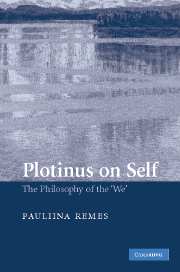Book contents
- Frontmatter
- Contents
- Acknowledgements
- Note on editions and abbreviations
- Introduction
- PART I THE ENDOWED STRUCTURES OF SELFHOOD
- 1 Two lives, two identities: the ontological and anthropological setting
- 2 The conscious centre
- 3 The rational self and its knowledge of itself
- PART II CONSTRUCTING THE SELF: BETWEEN THE WORLD AND THE IDEAL
- Conclusion
- Bibliography
- Index locorum
- General index
1 - Two lives, two identities: the ontological and anthropological setting
Published online by Cambridge University Press: 26 October 2009
- Frontmatter
- Contents
- Acknowledgements
- Note on editions and abbreviations
- Introduction
- PART I THE ENDOWED STRUCTURES OF SELFHOOD
- 1 Two lives, two identities: the ontological and anthropological setting
- 2 The conscious centre
- 3 The rational self and its knowledge of itself
- PART II CONSTRUCTING THE SELF: BETWEEN THE WORLD AND THE IDEAL
- Conclusion
- Bibliography
- Index locorum
- General index
Summary
There is a long Western tradition, one no longer much in fashion, in which the self is understood as being essentially double. On the one hand, each human being lives in and through the body, whereby his mind is filled with perceptions and desires that connect him to the surrounding world. On the other hand, many philosophers have thought that beyond perceptions and experiences there must be something or someone to whom the perceptions belong and who also unifies them; that is, that there is a unified centre of consciousness or rationality. This idea gets one of its expressions in the Kantian division between empirical self and transcendental subject. The two levels or natures of humanity which this kind of thinking entails are separated by having different functions, sometimes, as in Plato, even their own proper desires, and depending on the point of view of the inquiry, both have a claim to be a – or the – self. The division into a transcendental or higher, and an empirical or lower, self is connected with but not identical nor reducible to that of soul and body. For example, a dualist as well as a hylomorphist – someone who believes that the soul is not separable from the body but the form of the living body – both see human nature as essentially double, and both can argue that there is only one self, choosing either the composite or one of the parts that make up the composite as the self.
- Type
- Chapter
- Information
- Plotinus on SelfThe Philosophy of the 'We', pp. 23 - 91Publisher: Cambridge University PressPrint publication year: 2007



